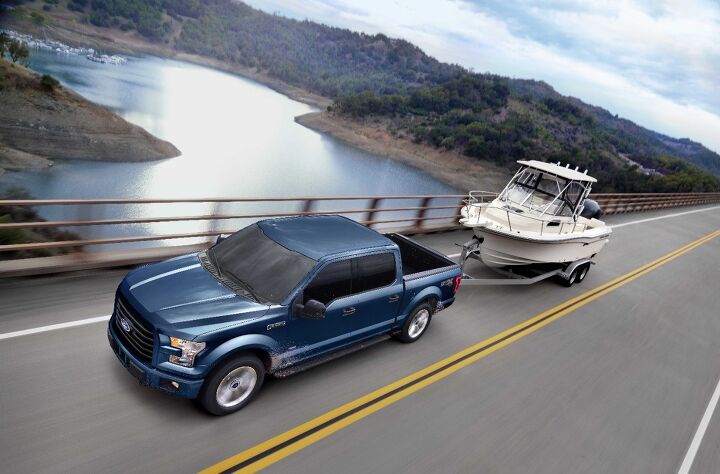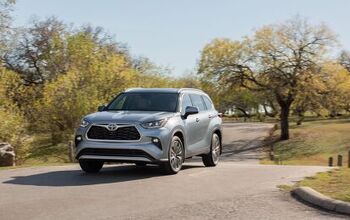Ford's Marketing Strategy for Plug-in F-150 Fixates on More Power

The pervasive opinion among truck enthusiasts and industry experts is that nobody cares about plug-in hybrid pickups. Fuel economy isn’t a major priority among those in the market for something that can haul bales of hay or a stable of horses.
This poses a problem for pickup manufacturers striving for lower emissions and fuel consumption. Ford, which previously lightened the F-150 and outfitted it with a bevy of more economical engines, knows this problem better than most.
However, Ford is pressing onwards. It even intends to bring a hybrid plug-in variant of its ultra-popular pickup to the market in the coming years. But how is it going to market the technology to consumers who are unlikely to care? The company has strategy for that and it’s less reliant on fuel savings than you might expect.
Ford is fixating on more power — specifically, the juice available via an on-board generator. “It still may be a hard sell,” Michelle Krebs, an analyst at Autotrader, explained to Bloomberg. “but they’ve got to have this in their lineup.” Ford is spending $4.5 billion to launch 13 electric and hybrid models by 2020, including a gas-electric Mustang. The hybridized F-150 is likely to be part of that electric expansion.
With its hands tied as a result of fuel efficiency regulations, Ford thinks it can highlight the benefits of owning a hybrid truck where you can plug in your appliances or tools. This revelation came after the company spent a year trying to figure out how best to market the new vehicle. “We immersed ourselves in their lives,” said Nadia Preston, the research team’s project leader, of the model’s buyers. “That meant going camping with them, tailgating, going to rodeos, even spending the night.”
Hau Thai-Tang, the product-development chief who has led the push toward EVs, said the team found that truck owners could benefit from having a mobile generator built into a vehicle. “We would see our customers just literally buying generators from Home Depot and strapping them down in their truck beds,” Thai-Tang said.
Whether used for camping or worksites, access to power is an invaluable asset and the lynchpin for Ford’s marketing strategy for the plug-in F-Series. Currently, the company hasn’t expressed how many hybrid trucks it hopes to sell, but analysts believe adding high-wattage power ports would add $5,000 to the base cost of most electrified vehicles. That’s quite a bit more than a portable generator, but Ford hasn’t announced any official pricing yet.
“You would need some motivation to invest in an electric pickup,” said Xavier Mosquet, senior partner at Boston Consulting Group, who claims pickups will be the segment least likely to be swept up in the electrification hullabaloo. “Unless you think the generator itself has value — which for many customers in this segment, it will.”
Either way, the automaker is not going to instantly abandon the existing powertrains. The F-Series can still be had with a V8, despite the undeniable might of the EcoBoost V6, and Ford is too smart to replace traditional engines with a hybrid powerplant. Shoppers will still have an abundance of choice in the years to come and the F-Series will probably persist as America’s best-selling truck for some time.
[Image: Ford Motor Co.]

A staunch consumer advocate tracking industry trends and regulation. Before joining TTAC, Matt spent a decade working for marketing and research firms based in NYC. Clients included several of the world’s largest automakers, global tire brands, and aftermarket part suppliers. Dissatisfied with the corporate world and resentful of having to wear suits everyday, he pivoted to writing about cars. Since then, that man has become an ardent supporter of the right-to-repair movement, been interviewed on the auto industry by national radio broadcasts, driven more rental cars than anyone ever should, participated in amateur rallying events, and received the requisite minimum training as sanctioned by the SCCA. Handy with a wrench, Matt grew up surrounded by Detroit auto workers and managed to get a pizza delivery job before he was legally eligible. He later found himself driving box trucks through Manhattan, guaranteeing future sympathy for actual truckers. He continues to conduct research pertaining to the automotive sector as an independent contractor and has since moved back to his native Michigan, closer to where the cars are born. A contrarian, Matt claims to prefer understeer — stating that front and all-wheel drive vehicles cater best to his driving style.
More by Matt Posky
Latest Car Reviews
Read moreLatest Product Reviews
Read moreRecent Comments
- MaintenanceCosts The crossover is now just "the car," part 261.
- SCE to AUX I'm shocked, but the numbers tell the story.
- SCE to AUX "If those numbers don’t bother you"Not to mention the depreciation. But it's a sweet ride.
- Shipwright Great news for those down south. But will it remove internal heat to the outside / reduce solar heat during cold winter months making it harder to keep the interior warm.
- Analoggrotto Hyundai is the greatest automotive innovator of the modern era, you can take my word for it.


































Comments
Join the conversation
Yeah. Because a hybrid pickup with on-board generator did so well when GM tried selling one 13 years ago.
So Ford has given up on making the the Ecobust engines reliable and efficient and now are going the hybrid route? There goes the pitiful weight savings from the beer can body and then some.